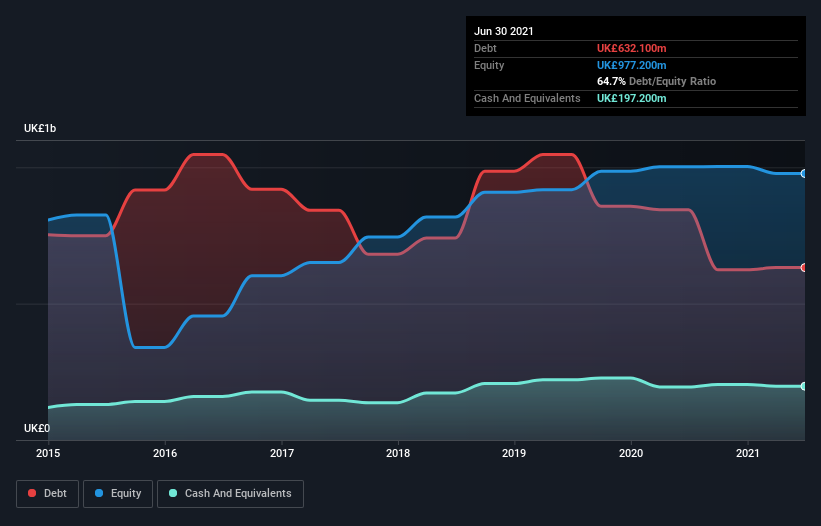- United Kingdom
- /
- Professional Services
- /
- LSE:ITRK
Intertek Group (LON:ITRK) Seems To Use Debt Quite Sensibly
Some say volatility, rather than debt, is the best way to think about risk as an investor, but Warren Buffett famously said that 'Volatility is far from synonymous with risk.' It's only natural to consider a company's balance sheet when you examine how risky it is, since debt is often involved when a business collapses. As with many other companies Intertek Group plc (LON:ITRK) makes use of debt. But should shareholders be worried about its use of debt?
Why Does Debt Bring Risk?
Debt is a tool to help businesses grow, but if a business is incapable of paying off its lenders, then it exists at their mercy. If things get really bad, the lenders can take control of the business. However, a more frequent (but still costly) occurrence is where a company must issue shares at bargain-basement prices, permanently diluting shareholders, just to shore up its balance sheet. Having said that, the most common situation is where a company manages its debt reasonably well - and to its own advantage. When we examine debt levels, we first consider both cash and debt levels, together.
View our latest analysis for Intertek Group
How Much Debt Does Intertek Group Carry?
You can click the graphic below for the historical numbers, but it shows that Intertek Group had UK£632.1m of debt in June 2021, down from UK£844.7m, one year before. However, it does have UK£197.2m in cash offsetting this, leading to net debt of about UK£434.9m.

How Strong Is Intertek Group's Balance Sheet?
We can see from the most recent balance sheet that Intertek Group had liabilities of UK£794.3m falling due within a year, and liabilities of UK£810.1m due beyond that. Offsetting this, it had UK£197.2m in cash and UK£638.9m in receivables that were due within 12 months. So its liabilities total UK£768.3m more than the combination of its cash and short-term receivables.
Since publicly traded Intertek Group shares are worth a very impressive total of UK£9.06b, it seems unlikely that this level of liabilities would be a major threat. Having said that, it's clear that we should continue to monitor its balance sheet, lest it change for the worse.
We measure a company's debt load relative to its earnings power by looking at its net debt divided by its earnings before interest, tax, depreciation, and amortization (EBITDA) and by calculating how easily its earnings before interest and tax (EBIT) cover its interest expense (interest cover). This way, we consider both the absolute quantum of the debt, as well as the interest rates paid on it.
Intertek Group has a low net debt to EBITDA ratio of only 0.71. And its EBIT easily covers its interest expense, being 16.4 times the size. So you could argue it is no more threatened by its debt than an elephant is by a mouse. The good news is that Intertek Group has increased its EBIT by 4.5% over twelve months, which should ease any concerns about debt repayment. When analysing debt levels, the balance sheet is the obvious place to start. But it is future earnings, more than anything, that will determine Intertek Group's ability to maintain a healthy balance sheet going forward. So if you're focused on the future you can check out this free report showing analyst profit forecasts.
Finally, a company can only pay off debt with cold hard cash, not accounting profits. So the logical step is to look at the proportion of that EBIT that is matched by actual free cash flow. Over the last three years, Intertek Group actually produced more free cash flow than EBIT. That sort of strong cash conversion gets us as excited as the crowd when the beat drops at a Daft Punk concert.
Our View
The good news is that Intertek Group's demonstrated ability to cover its interest expense with its EBIT delights us like a fluffy puppy does a toddler. And the good news does not stop there, as its conversion of EBIT to free cash flow also supports that impression! Looking at the bigger picture, we think Intertek Group's use of debt seems quite reasonable and we're not concerned about it. After all, sensible leverage can boost returns on equity. The balance sheet is clearly the area to focus on when you are analysing debt. However, not all investment risk resides within the balance sheet - far from it. Case in point: We've spotted 1 warning sign for Intertek Group you should be aware of.
If you're interested in investing in businesses that can grow profits without the burden of debt, then check out this free list of growing businesses that have net cash on the balance sheet.
New: AI Stock Screener & Alerts
Our new AI Stock Screener scans the market every day to uncover opportunities.
• Dividend Powerhouses (3%+ Yield)
• Undervalued Small Caps with Insider Buying
• High growth Tech and AI Companies
Or build your own from over 50 metrics.
Have feedback on this article? Concerned about the content? Get in touch with us directly. Alternatively, email editorial-team (at) simplywallst.com.
This article by Simply Wall St is general in nature. We provide commentary based on historical data and analyst forecasts only using an unbiased methodology and our articles are not intended to be financial advice. It does not constitute a recommendation to buy or sell any stock, and does not take account of your objectives, or your financial situation. We aim to bring you long-term focused analysis driven by fundamental data. Note that our analysis may not factor in the latest price-sensitive company announcements or qualitative material. Simply Wall St has no position in any stocks mentioned.
About LSE:ITRK
Intertek Group
Provides quality assurance solutions to various industries in the United Kingdom, the United States, China, Australia, and internationally.
Outstanding track record established dividend payer.
Similar Companies
Market Insights
Community Narratives



